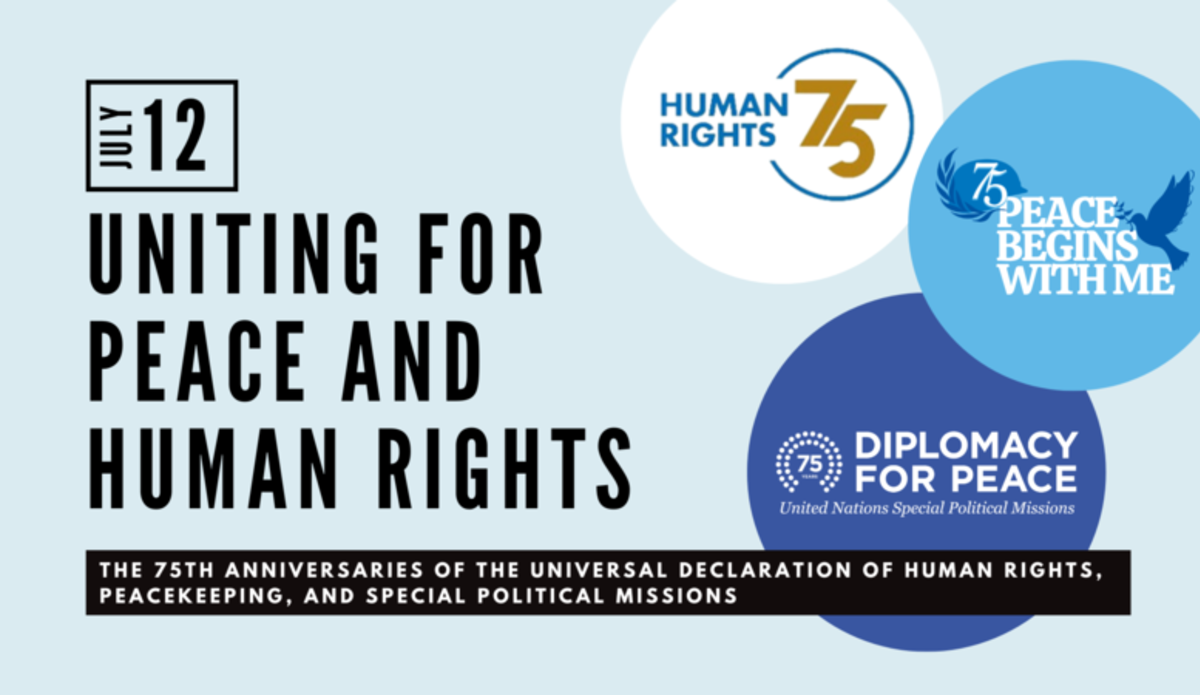ASSISTANT SECRETARY-GENERAL KHALED KHIARI’S
REMARKS AT THE OHCHR-DPPA-DPO JOINT EVENT
"UNITING FOR PEACE AND HUMAN RIGHTS:
THE 75TH ANNIVERSARIES OF THE UNIVERSAL DECLARATION OF HUMAN RIGHTS,
PEACEKEEPING, AND SPECIAL POLITICAL MISSIONS"
New York, 12 July 2023
Excellencies,
Dear Colleagues,
All of you know that the Count Folke Bernadotte was deployed as the United Nations Mediator in Palestine in May 1948. The first peacekeeping operation United Nations Truce Supervision Organization [UNTSO] was established a few weeks later. And in December, the General Assembly adopted the Universal Declaration of Human Rights. Few could have foreseen how important these innovations would be. Yet, they continue to shape the work of the United Nations 75 years later.
Special political missions have accompanied Member States through historic times of change: from supporting the decolonization and independence processes in Africa and Asia in the 1960s to assisting Central America in ending its civil wars and building peace in the 1990s, from facilitating the Bonn Agreement on Afghanistan in 2001 to aiding Nepal in its transition to peace and democracy; from accompanying Sierra Leone's remarkable peace consolidation process in the early 2010s to helping Colombia implement the peace agreement that ended the longest civil war in the Americas - with the most gender provisions in a peace agreement to date.
I also want to highlight the close cooperation between special political missions and peacekeeping operations, allowing them to bring together their respective expertise and build on their complementary roles to help advance peace in several complex situations.
Dear Colleagues,
The work of special political missions – to reduce risks, prevent conflict, broker peace agreements, and build sustainable peace – is a critical part of the human rights agenda. In Yemen, for example, the truce brokered by the United Nations has resulted in a remarkable 90 per cent reduction in conflict-related casualties.
The same is true of the work of special political missions in promoting inclusion and the full, equal, and meaningful participation of women and marginalized groups in political processes. These are not only central, normative human rights agendas for the UN but also pragmatic steps to ensure that political solutions are more durable. We cannot hope to address structural inequalities and other underlying causes of conflict if we do not work to shift the power structures that underpin our economies and political and social systems to advance the participation, protection, and rights of women and other marginalised groups.
These are not abstract notions but have been put into practice by every one of our missions on the ground. This includes the 7 SPMs with dedicated human rights mandates and capacities and the whole spectrum of Special Political Missions.
Human rights can also strengthen the quality and effectiveness of mediation at different stages, opening space for political negotiations, strengthening ongoing processes, and reinvigorating stalled efforts. DPPA and OHCHR have jointly collaborated on a project to show precisely how this can be done, with the dual objectives of fostering new creative approaches by mediation teams and closer collaboration between mediators and human rights practitioners.
Excellencies,
Dear Colleagues,
The Secretary-General's Call to Action for Human Rights has brought the United Nations system closer together around a simple yet powerful idea: that the human rights agenda remains indispensable in our efforts to build a more peaceful, just, and equitable world for all.
This is particularly crucial in a world facing a complex peace and security environment. Protracted civil wars, rising inequalities, shrinking civic space, the pervasive implications of new technologies, and the climate emergency are all issues that need to be tackled with inclusive peace and security and human rights lens at their core.
These challenges also require multilateral cooperation. However, at a time when urgent and united action is needed to address these interlocking crises, the world is growing more dangerously divided.
Next week, the Secretary-General will launch his policy brief on A New Agenda for Peace, which seeks to lay out how, in this emerging new era, fragmented and fractious as it may be, Member States can and must find avenues for cooperation towards shared interests and maintaining peace.
Special political missions, along with peacekeeping operations and international human rights instruments, will remain crucial tools in this endeavour, to advance multilateral action for peace and deliver for the people we serve.
Thank you.

